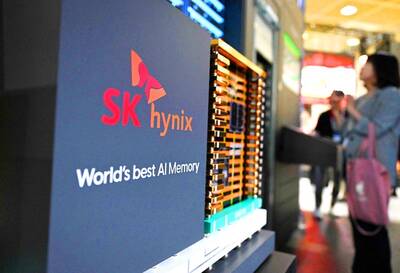EXCHANGES
TWSE names new chairman
The Taiwan Stock Exchange’s (TWSE) board members yesterday appointed Sherman Lin (林修銘), former chairman of Taiwan Depository and Clearing Corp (台灣集保), as its new chairman, while Chien Lih-chung (簡立忠) remains as TWSE president. Lin would take office today, the board said. Aged 57, Lin would be the youngest TWSE head in 60 years, its records showed. Meanwhile, the board directors of Fundrich Securities Co (基富通證券), a Taiwan Depository and Clearing unit, yesterday appointed Chu Han-chiang (朱漢強), a legal representative of the parent firm, as its new chairperson.
TELECOMS
Taiwan Mobile hikes wages
Taiwan Mobile Co (台灣大哥大) yesterday said it has stepped up salary hikes for employees to 7 percent this year in an effort to retain talent and help employees amid rising inflation. The wage hikes are higher than the 5.5 percent increases offered by Chunghwa Telecom Co (中華電信) for new employees, Taiwan Mobile said in a statement. On average, Taiwan Mobile employees receive about 18 months of salary a year, the statement said. The telecom operator said that it has a hybrid working model, with employees allowed to work from home 10 days a month.
ENERGY
HD dividend approved
HD Renewable Energy Co (泓德能源) yesterday said that shareholders have approved a cash dividend distribution of NT$2 per common share, a payout ratio of 66.23 percent based on the company’s earnings per share of NT$3.02 last year. Shareholders also approved a plan to list the company’s shares on the Taiwan Stock Exchange. With new green energy facilities launching operations this year, HD Renewable Energy’s revenue was NT$550 million (US$18.5 million) in the first quarter, almost tripling from the same period last year. Earnings per share soared to NT$1.03. The company said it has started building three new solar energy facilities in Tainan and Penghu County with total installed capacity of 100 megawatts a year. The facilities would be completed and connected to the grid by the end of this year, it said.
MANUFACTURING
Returning firms boost rate
Local manufacturers, mostly electronics companies, returning production to Taiwan last year, raised the proportion of locally made products to 48.4 percent of overall output, up 2.4 percentage points from the previous year, a survey conducted by the Ministry of Economic Affairs showed. Last year’s result was the highest since 2013, the ministry said. Last year’s proportion of goods made in China, including Hong Kong, was 42.4 percent, down 3.1 percentage points from 2020, it said. The ministry attributed the shift to a US-China trade dispute and restrictions amid the COVID-19 pandemic. Lower manufacturing costs were also a factor, it said. ASEAN members were favored among local manufacturers when shifting production out of China, with 3.2 percent of goods made in such nations last year, up 0.3 percentage points from a year earlier, it said. That made ASEAN the third-biggest manufacturing region for local manufacturers, the survey showed. About 70 percent of the 127 companies that have expanded production lines did so in Taiwan, the ministry said, adding that Southeast Asian countries were second with about 27 percent.

Intel Corp chief executive officer Lip-Bu Tan (陳立武) is expected to meet with Taiwanese suppliers next month in conjunction with the opening of the Computex Taipei trade show, supply chain sources said on Monday. The visit, the first for Tan to Taiwan since assuming his new post last month, would be aimed at enhancing Intel’s ties with suppliers in Taiwan as he attempts to help turn around the struggling US chipmaker, the sources said. Tan is to hold a banquet to celebrate Intel’s 40-year presence in Taiwan before Computex opens on May 20 and invite dozens of Taiwanese suppliers to exchange views

Application-specific integrated circuit designer Faraday Technology Corp (智原) yesterday said that although revenue this quarter would decline 30 percent from last quarter, it retained its full-year forecast of revenue growth of 100 percent. The company attributed the quarterly drop to a slowdown in customers’ production of chips using Faraday’s advanced packaging technology. The company is still confident about its revenue growth this year, given its strong “design-win” — or the projects it won to help customers design their chips, Faraday president Steve Wang (王國雍) told an online earnings conference. “The design-win this year is better than we expected. We believe we will win

Power supply and electronic components maker Delta Electronics Inc (台達電) yesterday said it plans to ship its new 1 megawatt charging systems for electric trucks and buses in the first half of next year at the earliest. The new charging piles, which deliver up to 1 megawatt of charging power, are designed for heavy-duty electric vehicles, and support a maximum current of 1,500 amperes and output of 1,250 volts, Delta said in a news release. “If everything goes smoothly, we could begin shipping those new charging systems as early as in the first half of next year,” a company official said. The new

SK Hynix Inc warned of increased volatility in the second half of this year despite resilient demand for artificial intelligence (AI) memory chips from big tech providers, reflecting the uncertainty surrounding US tariffs. The company reported a better-than-projected 158 percent jump in March-quarter operating income, propelled in part by stockpiling ahead of US President Donald Trump’s tariffs. SK Hynix stuck with a forecast for a doubling in demand for the high-bandwidth memory (HBM) essential to Nvidia Corp’s AI accelerators, which in turn drive giant data centers built by the likes of Microsoft Corp and Amazon.com Inc. That SK Hynix is maintaining its